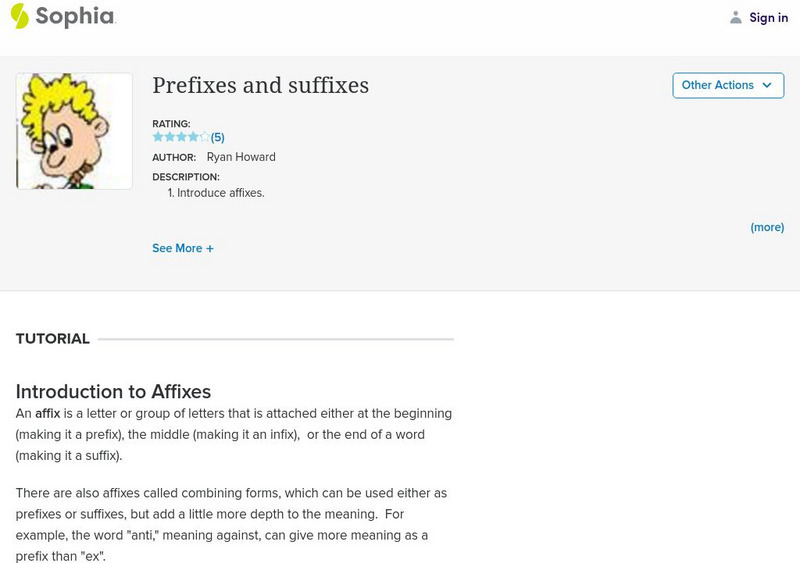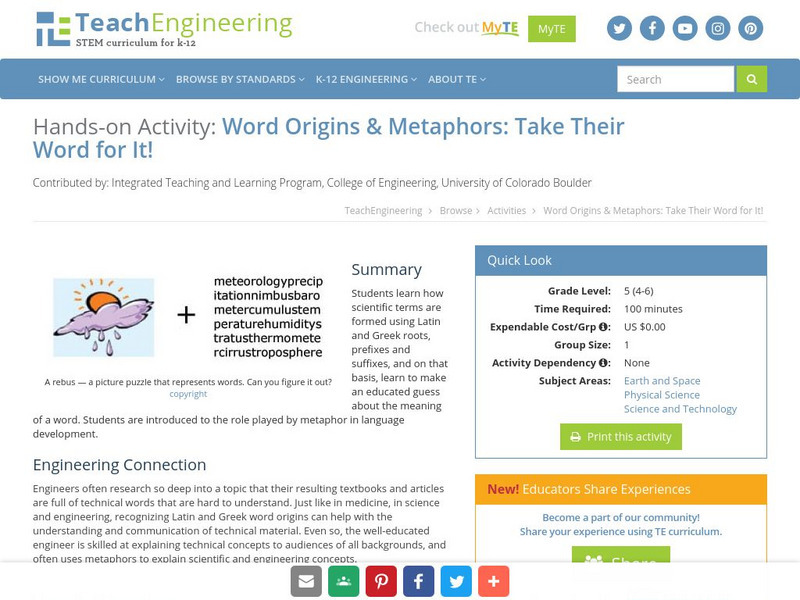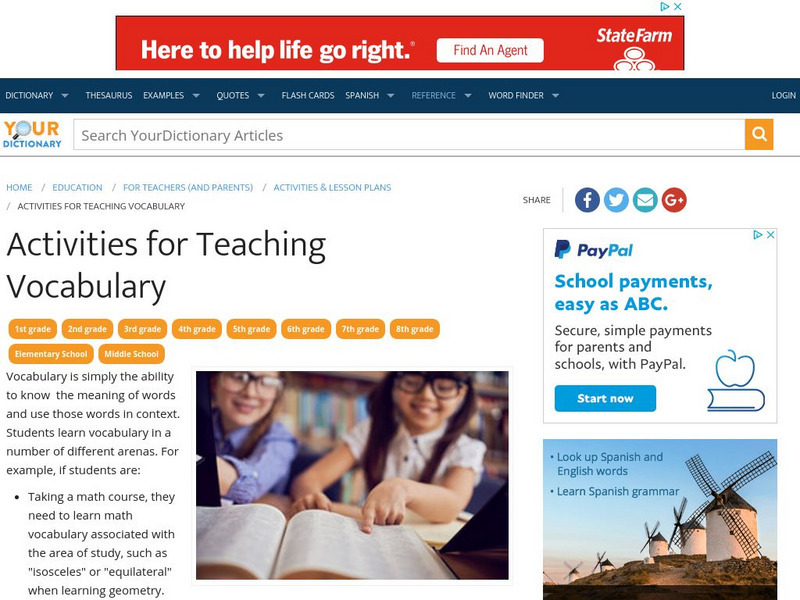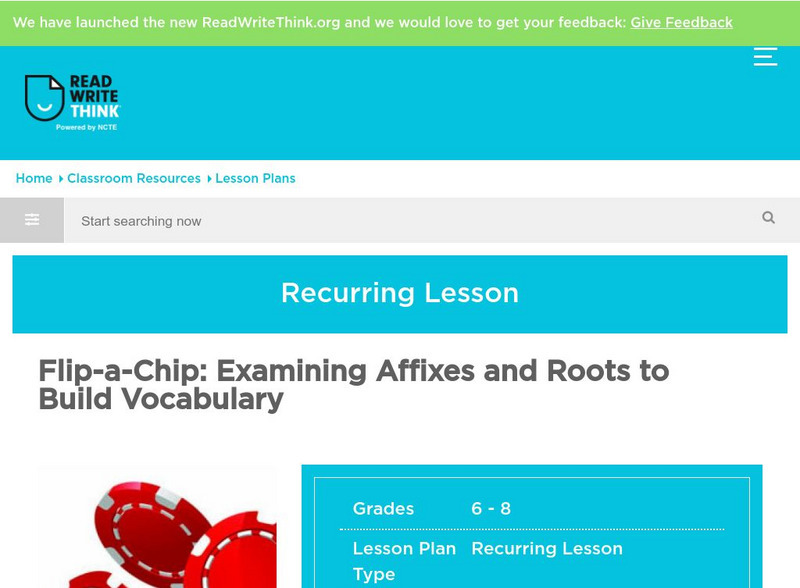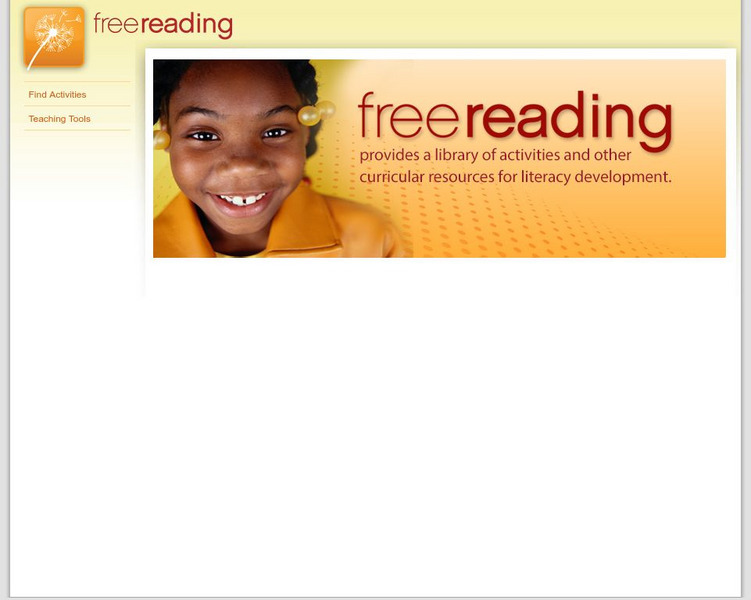Curated OER
Vocabulary Building - Declaration of Independence
Young scholars read the first part of the Declaration of Independence and mark the words they don't know. First, they try to guess what the words mean by looking at the them in context, and then they look up the words in a dictionary.
Curated OER
Air Pressure is Powerful
Students make a barometer and write a paragraph describing how they did it.
Curated OER
Term Paths
Students follow several pathways using anatomical directions on a simulated "body" produced from a copy of a school building's fire evacuation plan.
Curated OER
Simon Says
Second graders play Simon Says. The teacher uses a worksheet imbedded in this lesson which has suggestions for action commands to be used during the game. The intent is for students to focus on the action verbs which are built in to the...
Curated OER
Vowels, Reading Fluency
Third graders practice identifying words with the short o vowel sound. They use the strategy will reading a page from The Hare and the Tortoise. They read the passage while focusing on increasing their reading fluency and practice...
Curated OER
Figure It Out - Polygons
Sixth graders explore different polygons. In this polygon lesson, 6th graders examine a rhombus, quadrilateral, parallelogram, and rectangles. Students compare and contrast polygons and research shapes on the Internet.
Curated OER
Weather Watchers
Students study basic meteorology concepts. They build a simple barometer to measure air pressure. They explore the concepts of relative humidity, air convection currents and temperature inversions and to discover their connection to...
Curated OER
Rock the Boat
Second graders play a spelling game. They draw a card that shows two ways to divide a word into syllables. They are to choose which one is divided correctly, either A or B. They move along the game board as they choose correct answers.
Curated OER
Word Wall, If You Traveled West in a Covered Wagon
Third graders use vocabulary from "If You Traveled West in a Covered Wagon" to play a game.
Curated OER
Go Fish
First graders explore rhyming words. They listen to the book One Fish, Two Fish, Red Fish, Blue Fish and discuss the rhyming words. After being placed into groups, they play the game, "Go Fish" and find matching rhyming words. They...
SMART Technologies
Smart: Prefixes, Suffixes, and Root Words
Create words using prefixes, suffixes, and root words. Group the words together as words are created and add them to the word bank. Add your own prefixes, suffixes, and root words to extend the activity.
BBC
Bbc: Skillswise: Suffixes [Pdf]
BBC Skillswise offers a worksheet on suffixes for teachers and students.
Sophia Learning
Sophia: Prefixes and Suffixes
This tutorial begins with a YouTube video rapping about affixes including roots, prefixes, and suffixes. There are two slide shows including one about prefixes and one about suffixes; each includes definition, how it functions, and a...
SMART Technologies
Smart: Prefix and Suffix Mix Up
In this activity provided by SMART, students will learn the meaning of common prefixes and suffixes, practice combining root words with prefixes and suffixes, and recognize changes in words after combining prefixes and suffixes.
TeachEngineering
Teach Engineering: Take Their Word for It!
Students learn how scientific terms are formed using Latin and Greek roots, prefixes and suffixes, and on that basis, learn to make an educated guess about the meaning of a word. Students are introduced to the role played by metaphor in...
Love To Know Media
Your Dictionary: Activities for Teaching Vocabulary
This article focuses on the importance of teaching vocabulary and how to teach it effectively. It lists concepts that need to be considered when preparing to teach vocabulary such as prior knowledge, dictionary use, context clues, and...
Wisc-Online
Wisc Online: Practice With Suffixes (Nouns)
Interactively increase students understanding and use of vocabulary with an activity that highlights the concepts of suffixes and base words.
ReadWriteThink
Read Write Think: Flip a Chip: Examining Affixes and Roots to Build Vocabulary
Contains plans for a vocabulary lesson that uses an activity called Flip-a-Chip to teach about affixes. In addition to objectives and standards, this instructional plan contains links to sites used in the lesson as well as assessment and...
SMART Technologies
Smart: Exploring Prefixes and Suffixes
In this activity provided by SMART, students will learn the differences between prefixes and suffixes, as well as identify several different words and use them in sentences to help solidify which types of words represent prefixes and...
Free Reading
Free Reading
This free reading intervention site is geared toward students grade K-3, with literacy activities and lessons/ideas links. The site includes teaching tools and activities. See the link at the bottom to "About FreeReading" for a list of...
Better Lesson
Better Lesson: L.3.4b: Determine the Meaning When a Known Affix Is Added
Links to 5 lessons and activities that build student skills in standard L.3.4b: Determine the meaning of the new word formed when a known affix is added to a known word (e.g., agreeable/disagreeable, comfortable/uncomfortable,...
ClassFlow
Class Flow: Prefixes and Suffixes
[Free Registration/Login Required] This flipchart reviews the definition of prefixes and suffixes and includes an interactive activity using containers.
ReadWriteThink
Read Write Think: Improve Comprehension: A Word Game Using Root Words and Affixes
Contains plans for three lessons that teach about root words, prefixes, and suffixes using handouts, websites, and games. In addition to objectives and standards, this instructional plan contains links to sites used in the lessons as...
Scholastic
Scholastic: Instructor: Reading Clinic: Strategy Inventory
This lesson plan includes a group of activities that will teach learners how to use vocabulary knowledge to help with comprehension of a text. Split into three activities, this lesson plan encourages students to use prior knowledge, word...











![Bbc: Skillswise: Suffixes [Pdf] Unknown Type Bbc: Skillswise: Suffixes [Pdf] Unknown Type](https://content.lessonplanet.com/knovation/original/427801-1c421df72167125782c03004382645f0.jpg?1661260000)
